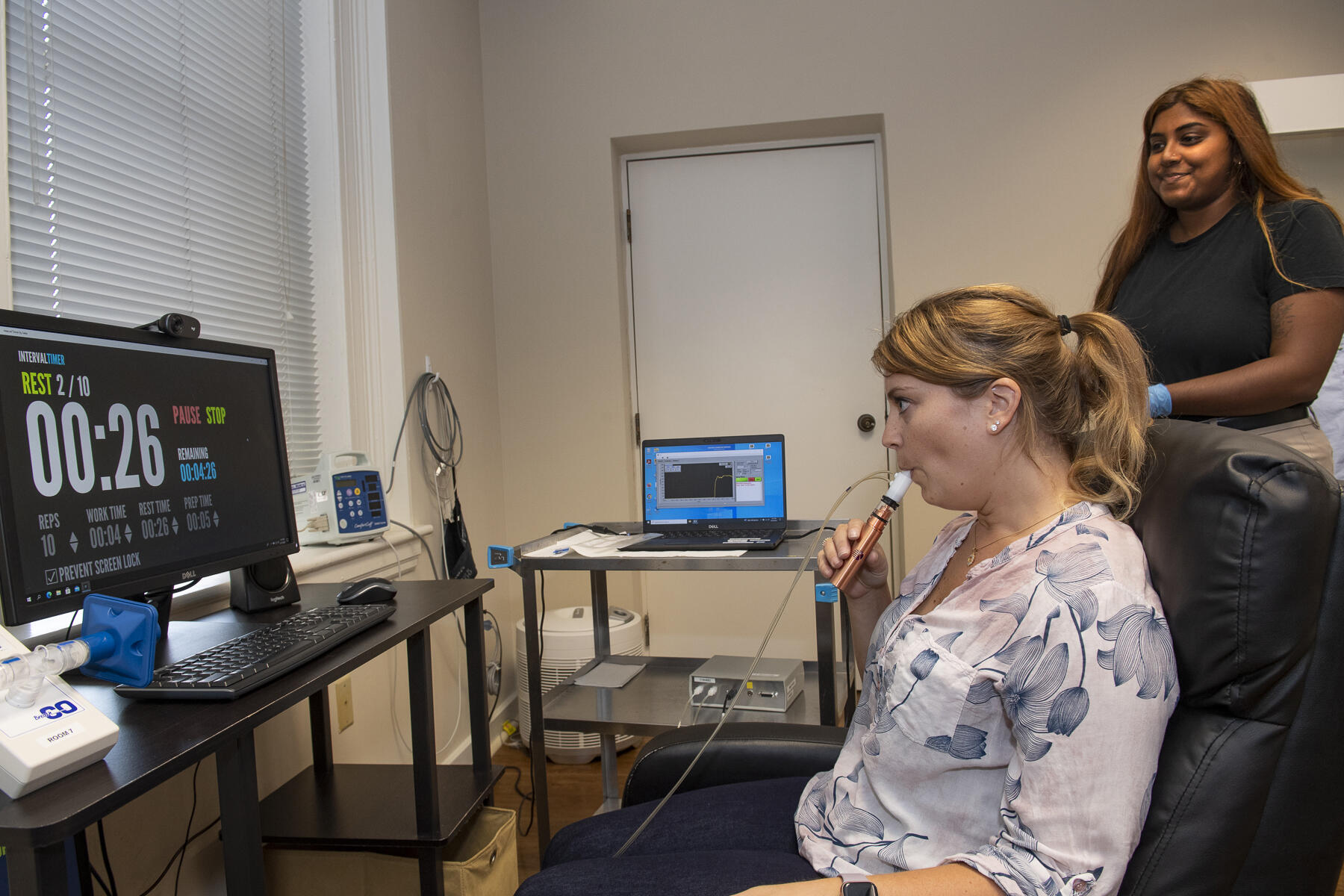
Dec. 4, 2023
Class of 2023: Alaina Holt’s research into vaping and THC-related products is helping keep the public safe
Share this story
E-liquids — the solution used in e-cigarettes — often contain unlisted ingredients, including ethanol, or alcohol. A team of Virginia Commonwealth University researchers, including doctoral student Alaina Holt, set out to discover if unknowingly vaping these e-liquids containing alcohol could cause a person who hadn’t been drinking to fail a sobriety test.
“We designed a clinical study where we had people come in and vape an e-liquid that had no ethanol or 20% ethanol,” said Holt, a student in VCU’s Integrative Life Sciences Program. “Then we had VCU Police Department officers come in and administer the breath tests that they give roadside and walk the participants through the field sobriety tests that you would do if you were pulled over.”
They found that vaping ethanol didn’t impact the standardized field sobriety test, which includes a horizontal gaze nystagmus test, walking heel-to-toe in a straight line, and standing on one foot. However, they did find that it could trigger a false positive when blowing into a breathalyzer shortly after vaping.
“Usually, law enforcement have a wait period [before administering a breath test],” Holt said. “Our research showed that we really need to make sure that law enforcement and other entities that use breath testing understand a wait period is necessary.”
Holt, who will receive her doctorate this month, first came to VCU in 2008 as an undergraduate student majoring in chemistry in the College of Humanities and Sciences. She graduated in 2014 and then returned to VCU to take additional courses that enabled her to earn a second undergraduate degree in forensic science in 2017.
When she returned for her second degree, Holt took a forensic chemistry course with Michelle Peace, Ph.D., a professor in the Department of Forensic Science and director of the Laboratory for Forensic Toxicology Research. Peace encouraged Holt to consider pursuing a doctorate at VCU and taking part in the vaping ethanol research project.

“At the time, I was managing at Ruth’s Chris Steakhouse full time, so my time was very limited,” Holt said. “But [Peace] knew that I needed to have lab experience so I came and did some research in her lab as an undergraduate. I guess I must have done a decent enough job that she was enthusiastic about me coming back.”
Peace said Holt is “exceptional,” both as a student and a researcher.
“I'm so fortunate to have had her on my research team,” she said. “In addition to her tenacity at the lab bench and her passion for public safety and public health, she has been a mentor and teacher to the lab team and a real servant leader. Her positive energy has been inspirational and motivational. She has definitely been at the center of how we make the magic happen.”
In addition to their work on e-liquids and unlisted ingredients, Holt has worked with Peace in recent years to study new and unregulated products containing synthetic or semi-synthetic cannabinoids, such as delta-8 THC.
Holt has also had the opportunity to accompany Peace in visiting the General Assembly, providing their expertise as Virginia lawmakers have considered regulations of vaping, cannabis, synthetic and semi-synthetic cannabinoids and more.
Holt is driven by a desire to help educate the public about potentially unsafe products that could lead to adverse health reactions.
“I’m very passionate about getting answers to the public, providing solid science to support policy change, new regulations, things of that nature,” she said. “I think that’s all just so fantastic and a great part of what we get to do.”
After receiving her doctorate, Holt plans to continue working in Peace’s lab as a postdoctoral researcher as part of a National Institute of Justice grant to study synthetic cannabinoids. They are also hoping to launch a project to study new technologies being deployed by law enforcement in Virginia for roadside impairment testing.
Looking back on her time as a VCU student, Holt is thankful to have found a love for forensic toxicology and to have found a mentor in Peace.
“Dr. Peace was a blessing that I didn’t know was coming my way. She has been the biggest advocate. Even my parents are constantly like, she is one of the best things that ever happened to you,” Holt said. “Just that chance meeting of taking her class that semester and the bond that we started building, it’s what set me down the path of forensic toxicology. It just clicked with me. It was just the perfect fit.”
Subscribe to VCU News
Subscribe to VCU News at newsletter.vcu.edu and receive a selection of stories, videos, photos, news clips and event listings in your inbox.







